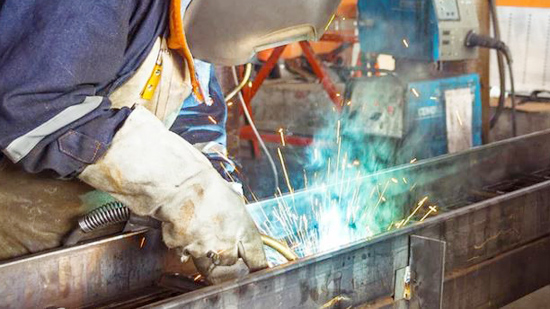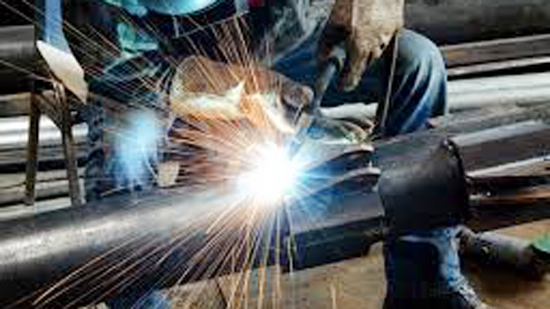The average Construction Welder Salary in the USA is around $45,000 to $60,000 per year. This can vary based on experience, location, and employer.
Welders in high-demand areas or with specialized skills may earn higher salaries. In the construction industry, welders play a crucial role in creating strong and durable structures. They use their expertise to join metal parts together, ensuring the integrity and safety of buildings, bridges, and other infrastructure projects.
As skilled tradespeople, construction welders must possess technical knowledge, attention to detail, and a commitment to quality workmanship. With the demand for construction projects on the rise, the need for qualified welders continues to grow, offering ample opportunities for those seeking a rewarding career in the field.

Photo from saratov myhistorypark
Construction Welder Salaries
The average Construction Welder salary in the USA is around $44,000 per year. This figure can vary based on factors such as location, experience, and employer. Skilled welders may command higher salaries due to the demand for their expertise in the construction industry.
Construction welding is a skilled trade that plays a crucial role in the construction industry. Welders are responsible for joining metal parts together using various welding techniques, and their expertise is in high demand across the United States.
If you’re considering a career in construction welding, it’s important to understand the salary potential in this field. In this blog post, we’ll explore the factors that influence welder income and compare wages across different states.
Factors Influencing Welder Income
Several factors can affect a construction welder’s income. These factors include:
Experience: Welders with more years of experience generally earn higher salaries as they gain expertise in their craft.
Certifications: Holding specific welding certifications, such as those offered by the American Welding Society (AWS), can lead to higher-paying job opportunities.
Specializations: Some welders specialize in specific types of welding, such as underwater welding or pipeline welding. These specialized skills often command higher wages.
Education and Training: Completing formal education and training programs in welding can enhance job prospects and potentially result in higher salaries.
Location: The geographical location of a welder can significantly impact their earning potential. Wages can vary based on factors such as cost of living, demand for welders, and local industry standards.
Comparing Wages Across States
When it comes to construction welder salaries, it’s important to consider the differences in wages across states. Here’s a comparison of average annual wages for construction welders in different states:
| State | Average Annual Salary |
|---|---|
| Texas | $50,910 |
| California | $52,080 |
| Florida | $40,760 |
| Ohio | $42,170 |
| Washington | $56,210 |
These figures are just examples, and actual wages may vary based on factors mentioned earlier. It’s important to research and consider the specific market conditions and opportunities in your desired location.
Understanding construction welder salaries is crucial for anyone considering a career in this field. Factors such as experience, certifications, specializations, education, and location all play a role in determining a welder’s income. By comparing wages across states, you can get a better idea of the earning potential in different areas.
Keep in mind that these figures are averages, and actual salaries may vary. Conduct thorough research and seek advice from industry professionals to make informed decisions about your career as a construction welder.
Educational Requirements For Construction Welders
Construction welders in the USA typically require a high school diploma or equivalent. The average construction welder salary in the USA ranges from $40,000 to $60,000 per year, depending on experience and location. Specialized certifications can lead to higher-paying opportunities in the field.
Certifications And Their Impact On Salary
Obtaining additional certifications can significantly increase a construction welder’s earning potential.
Advanced Training And Potential Pay Increases
Completing advanced training courses can lead to higher pay rates for welders.
Educational requirements for construction welders can vary, but typically a high school diploma or equivalent is sufficient.
Certifications such as the Certified Welder (CW) or Certified Welding Inspector (CWI) can boost a welder’s salary.
Advanced training programs, such as the American Welding Society’s (AWS) Certified Welding Educator (CWE) course, can result in significant pay increases.
Entry-level Vs. Experienced Welder Salaries
Entry-level welders in the construction industry in the USA can expect to earn an average salary of $40,000 per year, while experienced welders can earn up to $60,000 per year or more depending on their skills and location. The salary range can vary depending on factors such as certifications and years of experience.
When it comes to pursuing a career in welding, one of the key considerations is the potential salary. Understanding the difference between entry-level and experienced welder salaries can help individuals gauge their earning potential and plan their career paths accordingly.
Starting Pay For Beginners
For beginners in the welding field, the starting pay can vary based on factors such as location, industry, and the individual’s level of education and training. On average, entry-level welders in the United States can expect to earn around $15 to $20 per hour.
It is important to note that this is just a general range and the actual starting pay may be higher or lower depending on various factors. Welders who have completed a vocational training program or obtained a certification may have a higher starting salary compared to those without formal education.
Income Progression With Experience
As welders gain more experience and expertise in their craft, their earning potential tends to increase. With each year of experience, welders have the opportunity to command higher wages and take on more specialized roles within the industry.
The income progression with experience can be significant, with experienced welders earning considerably more than their entry-level counterparts. On average, experienced welders in the United States can earn anywhere between $25 and $35 per hour.
It is worth mentioning that income progression is not solely dependent on years of experience. Factors such as the level of skill, knowledge of specific welding techniques, additional certifications, and the ability to work on complex projects can also contribute to higher salaries.
Experienced welders may have the opportunity to move into supervisory or management positions, which can further increase their earning potential. These roles often come with additional responsibilities and require a combination of technical expertise and leadership skills.
Understanding the difference between entry-level and experienced welder salaries is crucial for individuals considering a career in welding. While entry-level welders can expect a starting pay of around $15 to $20 per hour, experienced welders can earn significantly more, ranging from $25 to $35 per hour. Income progression is influenced by factors such as experience, education, certifications, and specialized skills. With the right training and dedication, welders have the potential to build a successful and financially rewarding career in the construction industry.
Geographical Variations In Welder Compensation
Top Paying States For Welders
When it comes to construction welder salaries, the geographical location plays a crucial role in determining the compensation levels. Different states in the US offer varying pay scales for welders, with some regions standing out as top-paying destinations for these skilled professionals.
Rural Vs. Urban Welder Salaries
Urban and rural areas in the United States also exhibit disparities in welder salaries. While urban centers may boast higher average compensation, rural regions often offer competitive wages and lower living costs, resulting in a favorable overall compensation package for welders in these areas.
Industry-specific Welder Wages
Construction welder salaries in the USA vary based on the industry. According to the Bureau of Labor Statistics, as of May 2020, construction welders earn an average annual wage of $47,370. However, wages can differ significantly based on industry-specific factors such as location, experience, and employer.
As with any other profession, welders’ salaries vary depending on the industry they work in. In the United States, the construction sector is one of the most significant employers of welders. Knowing the construction welder salary in the USA is essential for anyone looking to pursue a career in this field.
Construction Sector Earnings
The construction industry employs welders to help construct buildings, bridges, and other infrastructure. According to the Bureau of Labor Statistics (BLS), the median pay for welders, cutters, solderers, and brazers in the construction sector was $46,590 per year, or $22.40 per hour, as of May 2020. This figure is slightly lower than the median for all welders in the United States, which was $44,190 per year, or $21.23 per hour.
Comparative Analysis With Other Industries
While the construction sector is a significant employer of welders, it is not the highest-paying industry for this profession. According to the BLS, the industries with the highest levels of employment for welders and the corresponding median wages are as follows:
| Industry | Median Annual Wage (May 2020) |
|---|---|
| Manufacturing | $41,380 |
| Wholesale Trade | $41,070 |
| Construction | $46,590 |
| Repair and Maintenance | $42,500 |
| Metalworking Machinery Manufacturing | $42,080 |
As shown in the table, the manufacturing industry, which includes the production of various goods such as machinery, transportation equipment, and fabricated metal products, is the largest employer of welders. It pays a lower median wage than the construction sector. On the other hand, the wholesale trade industry, which involves the sale of goods to other businesses, pays a similar median wage to the construction industry but employs fewer welders.
The construction welder salary in the USA is competitive, with a median wage of $46,590 per year. Other industries such as manufacturing and wholesale trade employ more welders and offer similar or lower median wages.
Impact Of Unionization On Welder’s Earnings
Welding is a specialized skill that has a significant impact on the construction industry. As a result, welders play a crucial role in construction projects, and their wages vary based on a variety of factors. One of the most significant factors that impact the earnings of welders is unionization. Joining a union can have a significant impact on a welder’s wages, benefits, and job security. In this post, we’ll explore the differences between union and non-union welder’s earnings.
Union Vs. Non-union Wage Differences
The wages of unionized welders are generally higher than those of non-union welders. According to the Bureau of Labor Statistics, the average hourly wage for a welder in the United States is $22.45. Unionized welders can earn up to 50% more than non-union welders. This is because unions negotiate higher wages and benefits for their members. In addition, unionized workers often receive better training, which can increase their earning potential.
Benefits And Job Security
Unionized welders also receive better benefits and job security than non-union welders. Unions negotiate benefits such as healthcare, retirement plans, and paid time off for their members. In addition, unionized workers have more job security, as unions work to protect their members from unfair treatment or termination. This can be especially valuable in times of economic uncertainty when non-union workers may be more vulnerable to layoffs.
Unionization can have a significant impact on a welder’s earnings, benefits, and job security. While joining a union may come with certain requirements and fees, the benefits can far outweigh the costs. Unionized welders earn higher wages, receive better benefits, and have more job security than non-union workers. If you’re a welder looking to increase your earning potential and improve your job security, joining a union may be a wise choice.
Overtime And Bonus Structures For Welders
Welders in the construction industry often benefit from additional compensation through overtime and bonuses. Let’s explore how these structures can impact a welder’s salary in the USA.
Standard Overtime Pay Rates
Welders are typically eligible for overtime pay when they work more than 40 hours a week. The standard overtime rate is usually 1.5 times the regular hourly wage.
Annual Bonuses And Profit Sharing
In addition to overtime, welders may receive annual bonuses and participate in profit-sharing programs. These bonuses are often based on performance and company profitability, providing an extra financial incentive.
Future Outlook For Welder Salaries
The future outlook for welder salaries in the USA is an important consideration for those entering the construction industry. By understanding the predicted salary trends and advancements that could impact pay, individuals can make informed decisions about their career paths.
Predicted Salary Trends
Welder salaries in the USA are expected to see steady growth in the coming years, driven by the increasing demand for skilled welding professionals in the construction sector. As infrastructure projects continue to expand and the need for welding expertise remains high, it is anticipated that welder salaries will reflect this trend. Employers are likely to offer competitive wages to attract and retain qualified welders, further contributing to the positive salary outlook.
Advancements And Their Potential Impact On Pay
Technological advancements in welding equipment and techniques have the potential to significantly impact welder salaries. The adoption of advanced welding processes and automated technologies may create opportunities for welders to enhance their skills and specialize in niche areas, leading to higher earning potential. Additionally, certifications in specialized welding practices can result in increased pay and greater job security for welders, positioning them as valuable assets in the construction industry.
Conclusion
The construction welder salary in the USA is influenced by various factors such as experience, location, and industry. It’s crucial for welders to stay updated with the latest industry trends and technologies to remain competitive in the job market. With the right skills and knowledge, welders can secure lucrative opportunities in the construction industry.

I’m Darrell Julian, the founder, lead writer, and hands-on welding enthusiast behind ArcWeldingPro.com. With more than 15 years of real-world welding experience, I created this platform to share what I’ve learned in the field, in the shop, and in the heat of the arc.



